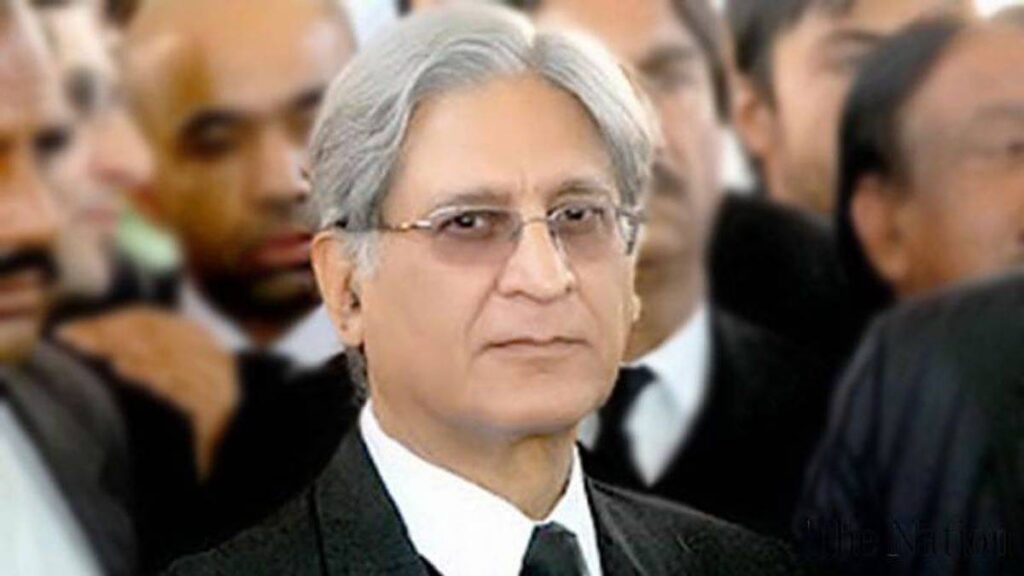- Web Desk
- Yesterday
During martial law, record was burned after the military trials: Aitzaz Ahsan
-

- Web Desk
- Feb 12, 2025

ISLAMABAD: The seven-member constitutional bench headed by Justice Aminuddin Khan resumed the hearing of plea against civilians’ trials in military courts case.
Convicted criminal Arzam Junaid’s counsel Salman Akram Raja resumed his arguments, and said that he will aim to complete his arguments today.
An interesting conversation took place between Justice Naeem Akhtar Afghan and Salman Akram Raja during the hearing. “I am saying this in a light-hearted manner, don’t take offense,” Justice Afghan said, adding, “You also have a political affiliation with a political party today. When your political party was in power, an amendment was made to the Army Act. At that time, the parliament enacted legislation related to the Army Act with great enthusiasm.”
Military trials case: Raja contests courts established outside Article 175
Raja responded that he was not part of Pakistan Tehreek-e-Insaf (PTI) at that time. “I was always on the opposition side,” he added.
Justice Muhammad Ali Mazhar said that the five-member bench abolished Section 2D of the Army Act. “After the abolition of Section 2D, there can be no military trial of spy elements. There are also civil servants in the army. If someone is spying for the enemy country under the guise of a civil servant, where will the trial of such a civil servant spy be held?” he asked.
Raja responded that the civil employees in the army are subject to the Army Act.
Justice Mazhar then asked, “If they are subject to the Army Act, they will be dismissed from their jobs. Where will the trial be in the absence of Section 2D?”
Justice Mandokhail asked if the disciplinary action against civil employee espionage under the Army Act will be separate from the military trial.
Raja said, “It is not that the state’s business cannot run without 2(1)(D).”
Justice Hassan Azhar Rizvi then asked, “If a civilian middleman hands over confidential secrets to the enemy, where will the trial be?” Raja replied, “His trial will be under the Special Under Official Secrets Act. There is a complete trial procedure under the Official Secrets Act.”
Salman Akram Raja continued, “I will not give arguments by twisting them at will against the principles and law. The case of Kulbhushan is before you. It does not happen in this world like this that the Constitution gives fundamental rights and then takes them away by gesturing one finger. It is not possible for the commanding officer to tell me to hand over Arzam Junaid to him.”
He added, “I have checked the record. Section 2(1)D(2) was approved by the Parliament in December 1967. Supreme Court can review the provisions of the Army Act without reviewing the FB Ali case.”
Justice Mandokhail asked, “Are we bound by the Constitution or are we bound by the court decision?”
Raja replied, “The Supreme Court decision is respected, but it is not necessary for the court.”
Justice Mandokhail then asked, “What will happen if the Constitution is changed?” Raja responded that then the situation will be different.
The counsel added, “At the time of the FB Ali case decision, Article 175, Clause 3, was not there.”
Justice Mazhar said, “We have to review the central decision, bring uniformity, and also interpret it, and [God knows] what else.”
Raja said, “A transparent trial cannot be held behind closed doors,” adding, “The 19th century court martial has now changed all over the world. In 2025, the proceedings of the 1860 court martial cannot be applied even to uniformed personnel.”
He said, “I don’t know what was happening for two years. Not even a single piece of paper was allowed to be taken out. Not even the right to bail was available. In the UK, the appointment of Judge Advocate General is done through the Judicial Commission that appoints High Court judges.”
At this point, lawyer Aitzaz Ahsan came to the rostrum and said, “[I was the lawyer] of Ayaz Supra and Major Ishtiaq Asif in the FB Ali case. At that time, the trial was held in Attock Jail. The record was burned after the trial. When the trial was over, we were thoroughly searched while leaving Attock Fort. Not even a single piece of paper was allowed to be taken out.”
Justice Musarrat Hilali said, “At that time, it was the era of martial law.”
Raja responded, “As a lawyer, I had to endure this every day in Adiala Jail.”
‘Appointment’ different from ‘transfer’: IHC Chief Justice rules
Justice Hilali asked, “Why were so many searches being conducted?” To this Raja answered, “Even my tie was being searched.” Lawyer Uzair Bhandari added to the discussion and said, “Even tissue paper was taken from me once.”
At this point, Justice Aminuddin asked the counsels to limit their arguments to the case at hand.
Later, the Constitutional Bench adjourned the hearing until tomorrow. Salman Akram Raja will continue the arguments tomorrow as well.




